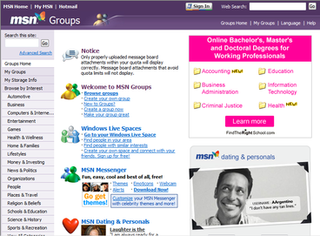Related Research Articles
A Usenet newsgroup is a repository usually within the Usenet system, for messages posted from many users in different locations using Internet. They are discussion groups and are not devoted to publishing news. Newsgroups are technically distinct from, but functionally similar to, discussion forums on the World Wide Web. Newsreader software is used to read the content of newsgroups.

Spamming is the use of messaging systems to send an unsolicited message (spam) to large numbers of recipients for the purpose of commercial advertising, for the purpose of non-commercial proselytizing, or for any prohibited purpose. While the most widely recognized form of spam is email spam, the term is applied to similar abuses in other media: instant messaging spam, Usenet newsgroup spam, Web search engine spam, spam in blogs, wiki spam, online classified ads spam, mobile phone messaging spam, Internet forum spam, junk fax transmissions, social spam, spam mobile apps, television advertising and file sharing spam. It is named after Spam, a luncheon meat, by way of a Monty Python sketch about a restaurant that has Spam in almost every dish and where vikings annoyingly sing "Spam" over and over again.

The Independent Media Center is an open publishing network of activist journalist collectives that report on political and social issues. Beginnings were made in London and Sydney during the 1999 Carnival Against Capital then the first Indymedia Media Center was founded to report on the protests against the World Trade Organisational Ministerial Conference in Seattle. Indymedia became closely associated with the global justice movement, which criticized neo-liberalism and its associated institutions.

The Southern Baptist Convention (SBC) is a Christian denomination based in the United States. It is the world's largest Baptist denomination, the largest Protestant denomination in the United States, and the second-largest Christian denomination in the United States, smaller only than the Roman Catholic Church according to self-reported membership statistics.

An Internet forum, or message board, is an online discussion site where people can hold conversations in the form of posted messages. They differ from chat rooms in that messages are often longer than one line of text, and are at least temporarily archived. Also, depending on the access level of a user or the forum set-up, a posted message might need to be approved by a moderator before it becomes publicly visible.

Text messaging, or texting, is the act of composing and sending electronic messages, typically consisting of alphabetic and numeric characters, between two or more users of mobile devices, desktops/laptops, or other type of compatible computer. Text messages may be sent over a cellular network, or may also be sent via an Internet connection.
Messaging spam, sometimes called SPIM, is a type of spam targeting users of instant messaging (IM) services, SMS, or private messages within websites.

Thomas Milburn Davis III is an American lobbyist and former Republican member of the United States House of Representatives who represented Virginia's 11th congressional district in Northern Virginia. Davis was considering a run for the U.S. Senate seat being vacated by five-term incumbent and fellow Republican John Warner in the 2008 election, but decided against it. He announced on January 30, 2008, that he would not seek reelection to an eighth term. Davis resigned from Congress on November 24, 2008.

The Connecticut General Assembly (CGA) is the state legislature of the U.S. state of Connecticut. It is a bicameral body composed of the 151-member House of Representatives and the 36-member Senate. It meets in the state capital, Hartford. There are no term limits for either chamber.

Free speech zones are areas set aside in public places for the purpose of political protesting. The First Amendment to the United States Constitution states that "Congress shall make no law ... abridging ... the right of the people peaceably to assemble, and to petition the Government for a redress of grievances." The existence of free speech zones is based on U.S. court decisions stipulating that the government may reasonably regulate the time, place, and manner – but not content – of expression.

The Republican National Convention (RNC) is a series of presidential nominating conventions held every four years since 1856 by the United States Republican Party. They are administered by the Republican National Committee. The goal of the Republican National Convention is to officially nominate and confirm a candidate for president and vice president, adopt a comprehensive party platform and unify the party, as well as publicize and launch the fall campaign. Delegates from all fifty U.S. states and from American dependencies and territories such as Puerto Rico and the Virgin Islands attend the convention and cast their votes. Like the Democratic National Convention, the Republican National Convention marks the formal end of the primary election period and the start of the general election season. In 2020 all paries replaced the usual conventions with short online programs.

MSN Groups was a website part of the MSN network which hosted online communities, and which contained Web pages, hosted images, and contained a message board. MSN Groups was shut down on February 21, 2009 as part of a migration of online applications and services to the Windows Live brand. Windows Live Groups, a part of the Windows Live branding, was never marketed as, or intended to be a replacement for, MSN groups.
The Institute for Applied Autonomy was an activist group of anonymous artists known for employing technology in protest. The group focused on dissemination of knowledge, autonomy, and methods of self-determination through artistic expression and application of military-like technology to the topics of Criminal Mischief, decentralized systems and individual autonomy.
Microblogging is an online broadcast medium that exists as a specific form of blogging. A micro-blog differs from a traditional blog in that its content is typically smaller in both actual and aggregated file size. Micro-blogs "allow users to exchange small elements of content such as short sentences, individual images, or video links", which may be the major reason for their popularity. These small messages are sometimes called microposts.
GroupMe is a mobile group messaging app owned by Microsoft. It was launched in May 2010 by the private company GroupMe. In August 2011, GroupMe delivered over 100 million messages each month and by June 2012, that number jumped to 550 million. In 2013, GroupMe had over 12 million registered users.
Rankin & Taylor is a civil rights and criminal defense law practice that was founded in 2008. The firm has represented clients in First Amendment and Police misconduct cases, and numerous Critical Mass cyclists in both civil and criminal cases. The firm's founding partners are cyclists and members of the National Lawyers Guild.

Telegram is a cloud-based instant messaging, videotelephony and voice over IP service with end-to-end encrypted chat for secret chat only. Telegram client apps are available for Android, iOS, Windows Phone, Windows, macOS and GNU/Linux and originated in Russia in 2013. Users can send messages and exchange photos, videos, stickers, audio and files of any type.

Signal Messenger, LLC, is a software organization that was founded by Moxie Marlinspike and Brian Acton in 2018 to take over the role of the Open Whisper Systems project that Marlinspike founded in 2013. Its main focus is the development of the Signal app and the Signal Protocol. The organization is funded by the non-profit Signal Foundation, and all of its products are published as free and open-source software.

Signal is a cross-platform encrypted messaging service developed by the Signal Foundation and Signal Messenger LLC. It uses the Internet to send one-to-one and group messages, which can include files, voice notes, images and videos. Its mobile apps can also make one-to-one voice and video calls, and the Android version can optionally function as an SMS app.

Mastodon is a free and open-source self-hosted social networking service. It allows anyone to host their own server node in the network, and its various separately operated user bases are federated across many different servers. These nodes are referred to as "instances" by Mastodon users. These servers are connected as a federated social network, allowing users from different servers to interact with each other seamlessly. Mastodon is a part of the wider Fediverse, allowing its users to also interact with users on different open platforms that support the same protocol, such as PeerTube and Friendica.
References
- ↑ "TXT MOB technology unites social networks". Gizmag. November 25, 2004. Retrieved June 18, 2015.
- ↑ City Subpoenas Creator of Text Messaging Code, Colin Moynihan, New York Times, March 30, 2008
- ↑ ”The other thing was @blaine and i were hacking on txtmob.org which is an open source group text messaging system. We spent a lot of time talking about txtmob, trying it, figuring out why it didn’t work." Comment from @rabble at Sagolla, Dom (2009-01-30). "How Twitter Was Born". 140 Characters. Archived from the original on June 9, 2009. Retrieved 2009-06-25.
- ↑ Protalinski, Emil (October 16, 2013). "Twitter was first created by adapting status-sharing service TXTmob for mainstream use, founder claims". The Next Web . Retrieved March 12, 2019.
- ↑ Flood, Catherine; Grindon, Gavin, eds. (2014). Disobedient Objects. V&A Publishing. p. 14.
- ↑ Hirsch, Tad (28 May 2020). "TXTmob and Twitter: A Reply to Nick Bilton". Medium. Retrieved 11 June 2020.
- ↑ Costanza-Chock, Sasha; Radelich, Alex; Hirsch, Tad; Childs, Quincy (1 June 2020). "In the open: TXTmob and Twitter". The Knowledge Futures Commonplace. doi: 10.21428/6ffd8432.fec9fd40 . Retrieved 11 June 2020.